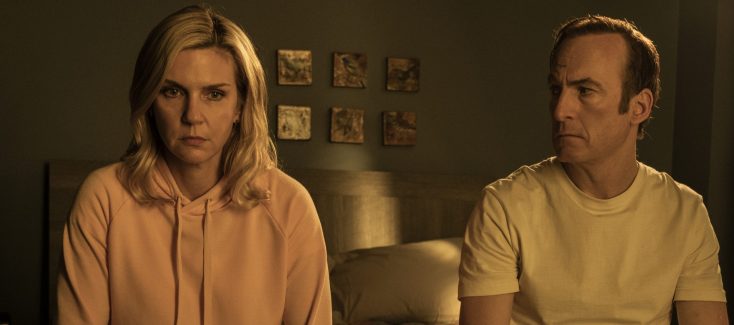
(l-r) Executive Producer Vince Gilligan and Bob Odenkirk as Saul Goodman on the set of BETTER CALL SAUL. ©Sony Picxtures Television/AMC CR:: Greg Lewis/AMC/Sony Pictures Television
By ANGELA DAWSON and JUDY SLOANE
Front Row Features
HOLLYWOOD—After watching six seasons of the “Breaking Bad” spinoff “Better Call Saul,” fans of the AMC series are eagerly anticipating the series finale, which airs Monday, Aug. 15.
Co-creators and executive producers Vince Gilligan and Peter Gould, along with the series’ stars Bob Odenkirk and Rhea Seehorn were in attendance at the Television Critics Association panel discussion. Here’s what they had to say about the popular award-winning series and bringing it to an end.
Q: Can you talk about the expectations for this final episode, both for yourselves when writing it and for fans? Who will be harder to satisfy—the writers or the fans?
Vince Gilligan: If we don’t win the Nobel prize for this, I’m going to be very disappointed. (The expectations) are high, wouldn’t you say, Peter? What do you think?
Peter Gould: It’s a lot of pressure. It’s very scary. (There are) a lot of sweaty palms; a lot of sleepless nights. When you say, “Who are you going to please?” I think we know. Those of us on the show are very happy with where it ended. I hope everybody else agrees. The thing I’m most proud of is the show is that it stayed true to itself. We’re playing in the same court we started in. Whether people find it all (meets) their dreams and hopes, all we can do is hope. But a Nobel prize would be great, yeah.
Q: Bob, has playing Jimmy/Saul Goodman been transformative for you?
Bob Odenkirk: I learned that acting can be challenging. I didn’t used to think that. In fact, I used to pooh-pooh that notion. I’d say, “You’re an idiot.” But now I think that’s not true. Acting can be hard, and it’s just an addition to that lesson is acting is rewarding when it’s hard.
Those days that were the most difficult were when I had to really lose myself or connect with something inside myself where I kind of deeply felt. Those are the days where I came home from work thinking that was really cool what I got to do today. So, I learned a lot about the job of doing this, which is not something I thought about before I had the opportunity.
Q: How was it playing this evolution of the Jimmy to Saul (and Gene) character between “Breaking Bad” and “Better Call Saul?” He seems to be in an addictive loop of getting away with cons he commits.
Odenkirk: I felt bad for him, you know? It’s maybe not a great instinct, but you want your character to do the right thing. The more he did this, the more I wanted him to pull back or see what he was doing. It’s just not what this job is or it’s not really what you want to see as an audience member. You want to see somebody go deep into their craziness. In this case, he just kept going. At a certain point, he was driven by self-destruction.
I thought a lot about “Leaving Las Vegas.” Jimmy’s scam that included Marion and the characters with the shopping mall crime and how he was just going to take that until he cracked it. Rather, the crime regarding getting these rich guys drunk and stealing their private information—that was the round of Jimmy/Saul scamming that was just unhinged. It had no purpose at all outside of grinding that itch to do something crazy and take it to the limit, and, I think, to get caught or crack up. I feel bad that he made that choice, but … I feel wonderful and excited and thrilled about when the writers came up with regarding the finale.
Gilligan: Adding to that, from a writer’s point of view, it’s a tragedy. This show’s a tragedy. As a writer, you can’t help but the character gets intertwined with the actor playing the character. When you watch Jimmy/Saul/Gene (Odenkirk’s character), I picture him snipping off pieces of his soul with a pair of tin snips. It’s just, what the hell? Why is he acting like this? It’s a tragedy and it gets more and more uncomfortable and sad.
Gould: I always think about sitting and watching this show and “Breaking Bad” with my wife, who doesn’t really know what is going to happen, and I hear her saying, “No! No! Jimmy. No, Saul. Wait!” and I think the ultimate compliment is emotional engagement with the characters. I feel like we’ve really done our jobs if people are watching and really care about these characters.
Q: How would you describe the tone of the finale and do you have any interest in exploring more stories in this universe?
Gilligan: I can talk with unabashed delight about the finale, because I had very little to do with it. Peter (Gould) wrote and directed it, and he is a modest gentleman, so he’s not going to talk about how friggin’ great it is. It is awesome. I can’t wait for people to see it. It was such a delight. I was busy shooting (episode) 12 when Peter was writing and directing (episode) 13. I can’t wait for people to see it.
An earlier question was about how anxious are (about the finale). I’m not as anxious nearly as I was with “Breaking Bad” because—and I don’t know if it’s because I’m getting older—I’ve got other things to worry about with the world ending, stuff like that. I can’t wait to see how people are going react to this. I’m so proud of it. Peter did a fantastic job.
Gould: I’m always freaking out and stressed. This is just another day at work. It was a privilege, you know? It’s a privilege to get to work with all these people. I work with the best cast and crew in television. It’s the ideal situation for any director. I did write the script myself, but I got to break it with Vince and with the best writers’ room anywhere. Hopefully people like it the way we do.
Q: How about you, Bob?
Odenkirk: I’m not stressed out, and I haven’t been since I read it because (Gould) and the writers have found a way to deliver on the heart of the show. The other reason I’m not stressed out is over the course of six years, I feel like the audience has been amazing. They are dialed in to what this show is about. “Breaking Bad” is such a huge monster show, and it is a cornerstone of television. I was always concerned about that show casting the wrong dimension onto our show as we found our feet. But I don’t think it’s happened. We’ve been allowed to find our own place to live on our own what matters to this show, the place this show lives in. This ending goes right to the heart of where this show found itself.
Q: Rhea, the second to last episode answered the question of whether Kim Wexler was alive during the “Breaking Bad” era. Do you think after all was said and done, that Kim still loved Jimmy/Saul?
Rhea Seehorn: Yes, I absolutely think she still has love for Jimmy. Even in the heartbreaking episode where they break up, it was never because she didn’t love him. That is not how she came to the decision she made.
Q: Do you think you’ll ever revisit the characters from “Breaking Bad” or “Better Call Saul?”
Gilligan: You can’t keep putting all your money on red 21 over and over again. I feel like we probably pushed it doing a spinoff to “Breaking Bad.” I could not be more happy with the results. And then I did “El Camino,” and I’m very proud of that too. But I’m starting to sense you’ve got to know when to leave the party. So, I don’t have any plans right now to do anything more with this universe.
Q: Do you think you’re tonally going to stay in this space or are you looking to do something completely different?
Odenkirk: I’m looking to do something different. I’ve really, really enjoyed this. This has been crazy. To some extent, I don’t think I’ll ever have anything as wide-ranging as this character has been. The dynamics of this character are crazy. I get to do pure comedy, and I get to do pure drama. It’s just nuts that I get to do that in the same show.
On the other hand, I think the fun of acting, one of the reasons to go into showbiz is to do different things. I don’t understand somebody who wants a job for 30 years that’s the same job. But, God bless them. When I got into this business, I did sketch comedy. The reason you do that is you’re doing a different thing every four minutes. So, I’m excited to do something different and then something totally different from that next.
Seehorn: My brain goes more towards how do I configure a way to work with these people again? This quality of writing, this quality of cast, this quality of showrunners and directors. I know Bob and I intend to work together, and I’m just going to make him write things for me. Working with Vince and Peter and our whole murderer’s row of writers is something that I really hope to manifest. Tonally, Bob’s right. You want to play something different but the actual genre or tone shift to me is less important than the character in the script.





